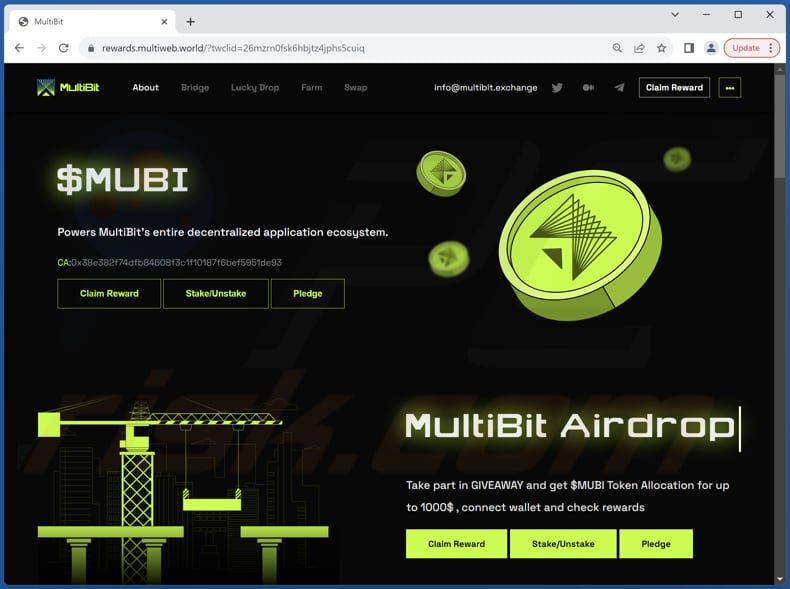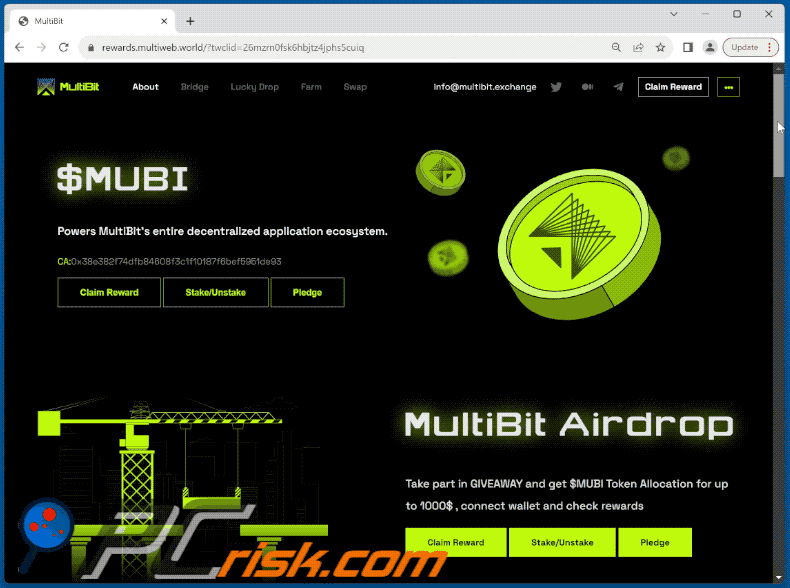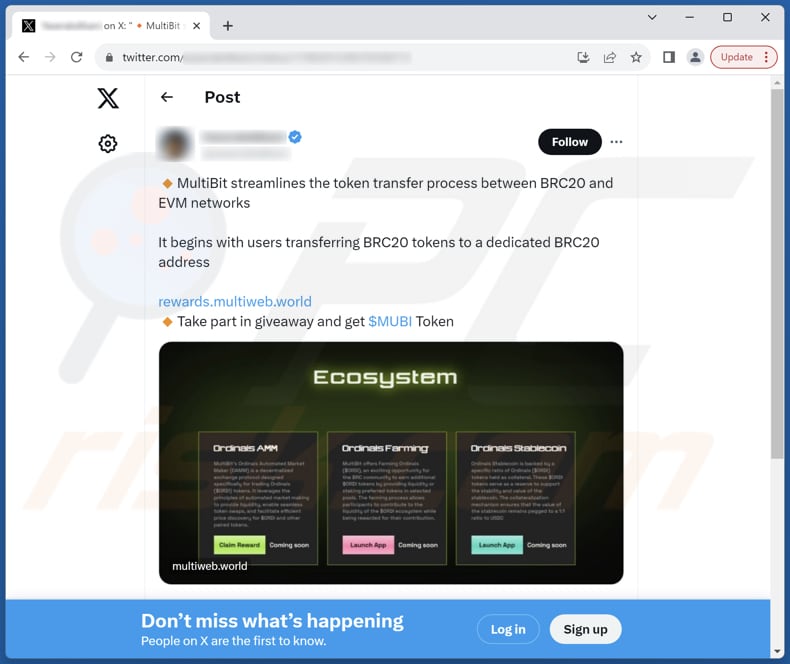How to avoid losing money through scams like MultiBit airdrop
Phishing/ScamAlso Known As: MultiBit fake crypto giveaway
Get free scan and check if your device is infected.
Remove it nowTo use full-featured product, you have to purchase a license for Combo Cleaner. Seven days free trial available. Combo Cleaner is owned and operated by RCS LT, the parent company of PCRisk.com.
What is "MultiBit Airdrop"?
It has been uncovered that this is a fake cryptocurrency giveaway (airdrop) being promoted through misleading posts on X (Twitter). Those orchestrating this fraudulent scheme intend to entice individuals to access a counterfeit page and adhere to the provided instructions, resulting in financial losses. Consequently, it is strongly advised to disregard the posts and pages associated with this scam.

"MultiBit Airdrop" scam in detail
The post on X promoting this scam encourages users to take part in a giveaway and get a $MUBI token. Clicking the provided link opens a deceptive page (rewards.multiweb[.]world or multibitevm[.]com) masquerading as the MultiBit site. The opened website instructs visitors to claim a reward by connecting a wallet.
Engaging in this process leads to the endorsement of a harmful contract, triggering the activation of a draining mechanism. This drainer is specifically designed to siphon cryptocurrency from targeted wallets.
Once activated, the drainer transfers digital currency from the victim's wallet to the scammers' wallet. It's crucial to recognize that cryptocurrency transactions are frequently irreversible, complicating the efforts to trace and recover funds once the transfer has occurred.
Hence, it is strongly recommended to exercise caution when interacting with cryptocurrency-related websites. It is paramount to verify their legitimacy thoroughly before undertaking any actions to mitigate the risk of falling victim to such fraudulent schemes.
| Name | MultiBit fake crypto giveaway |
| Threat Type | Phishing, Scam, Social Engineering, Fraud |
| Fake Claim | Participants can claim free cryptocurrency |
| Disguise | Legitimate cryptocurrency giveaway |
| Related Domains | multiweb[.]world, multibitevm[.]com |
| Detection Names (multiweb[.]world) | Avira (Phishing), CyRadar (Malicious), Fortinet (Phishing), Kaspersky (Malware), Sophos (Phishing), Full List Of Detections (VirusTotal) |
| Detection Names (multibitevm[.]com) | Fortinet (Spam), Seclookup (Malicious), Full List Of Detections (VirusTotal) |
| Symptoms | Lack of official verification, unrealistic claims, too good-to-be-true promises. |
| Distribution methods | Post on X (Twitter), deceptive websites, rogue online pop-up ads, potentially unwanted applications. |
| Damage | Loss of sensitive private information, monetary loss, identity theft, possible malware infections. |
| Malware Removal (Windows) |
To eliminate possible malware infections, scan your computer with legitimate antivirus software. Our security researchers recommend using Combo Cleaner. Download Combo CleanerTo use full-featured product, you have to purchase a license for Combo Cleaner. 7 days free trial available. Combo Cleaner is owned and operated by RCS LT, the parent company of PCRisk.com. |
Similar scams in general
Fake crypto giveaways typically share common characteristics such as deceptive promotions, misleading posts, and attempts to lure individuals into engaging with fraudulent schemes. They often involve the promise of free tokens or rewards, aiming to trick users into taking actions that lead to financial losses.
More examples of fake websites used to trick users into running crypto drainers are "revoke.cash", "Less Fees & Gas", and "Jito (JTO) Token Airdrop".
How did I open a scam website?
The described scam is promoted via deceptive posts on X (formerly Twitter). Users land on a scam website through the link provided in the post. In other cases, users open scam websites via links or attachments in fraudulent emails, misleading advertisements, notifications from untrustworthy websites, and sites that use rogue advertising networks (commonly torrent sites and illegal movie streaming pages).
Sometimes, installed advertising-supported programs lead users to unreliable pages. As a rule, users open scam websites unintentionally.
How to avoid visiting scam pages?
Stick to reputable search engines like Google, Bing, or Yahoo. Exercise caution while browsing by avoiding interaction with ads and pop-ups on dubious websites. Also, refrain from clicking on links in unexpected emails and messages. Consistently update your browser, antivirus software, and operating system.
In addition to these precautions, ensure that you exclusively obtain files and applications from reliable sources, such as official websites and trusted app stores. As an extra layer of protection, make it a routine to conduct regular system scans using a reputable security tool.
If your computer is already infected with unwanted apps, we recommend running a scan with Combo Cleaner Antivirus for Windows to automatically eliminate them.
The appearance of "MultiBit Airdrop" pop-up scam (GIF):

Post on X (Twitter) promoting this scam:

Instant automatic malware removal:
Manual threat removal might be a lengthy and complicated process that requires advanced IT skills. Combo Cleaner is a professional automatic malware removal tool that is recommended to get rid of malware. Download it by clicking the button below:
DOWNLOAD Combo CleanerBy downloading any software listed on this website you agree to our Privacy Policy and Terms of Use. To use full-featured product, you have to purchase a license for Combo Cleaner. 7 days free trial available. Combo Cleaner is owned and operated by RCS LT, the parent company of PCRisk.com.
Quick menu:
- What is MultiBit fake crypto giveaway?
- How to identify a pop-up scam?
- How do pop-up scams work?
- How to remove fake pop-ups?
- How to prevent fake pop-ups?
- What to do if you fell for a pop-up scam?
How to identify a pop-up scam?
Pop-up windows with various fake messages are a common type of lures cybercriminals use. They collect sensitive personal data, trick Internet users into calling fake tech support numbers, subscribe to useless online services, invest in shady cryptocurrency schemes, etc.
While in the majority of cases these pop-ups don't infect users' devices with malware, they can cause direct monetary loss or could result in identity theft.
Cybercriminals strive to create their rogue pop-up windows to look trustworthy, however, scams typically have the following characteristics:
- Spelling mistakes and non-professional images - Closely inspect the information displayed in a pop-up. Spelling mistakes and unprofessional images could be a sign of a scam.
- Sense of urgency - Countdown timer with a couple of minutes on it, asking you to enter your personal information or subscribe to some online service.
- Statements that you won something - If you haven't participated in a lottery, online competition, etc., and you see a pop-up window stating that you won.
- Computer or mobile device scan - A pop-up window that scans your device and informs of detected issues - is undoubtedly a scam; webpages cannot perform such actions.
- Exclusivity - Pop-up windows stating that only you are given secret access to a financial scheme that can quickly make you rich.
Example of a pop-up scam:

How do pop-up scams work?
Cybercriminals and deceptive marketers usually use various advertising networks, search engine poisoning techniques, and shady websites to generate traffic to their pop-ups. Users land on their online lures after clicking on fake download buttons, using a torrent website, or simply clicking on an Internet search engine result.
Based on users' location and device information, they are presented with a scam pop-up. Lures presented in such pop-ups range from get-rich-quick schemes to fake virus scans.
How to remove fake pop-ups?
In most cases, pop-up scams do not infect users' devices with malware. If you encountered a scam pop-up, simply closing it should be enough. In some cases scam, pop-ups may be hard to close; in such cases - close your Internet browser and restart it.
In extremely rare cases, you might need to reset your Internet browser. For this, use our instructions explaining how to reset Internet browser settings.
How to prevent fake pop-ups?
To prevent seeing pop-up scams, you should visit only reputable websites. Torrent, Crack, free online movie streaming, YouTube video download, and other websites of similar reputation commonly redirect Internet users to pop-up scams.
To minimize the risk of encountering pop-up scams, you should keep your Internet browsers up-to-date and use reputable anti-malware application. For this purpose, we recommend Combo Cleaner Antivirus for Windows.
What to do if you fell for a pop-up scam?
This depends on the type of scam that you fell for. Most commonly, pop-up scams try to trick users into sending money, giving away personal information, or giving access to one's device.
- If you sent money to scammers: You should contact your financial institution and explain that you were scammed. If informed promptly, there's a chance to get your money back.
- If you gave away your personal information: You should change your passwords and enable two-factor authentication in all online services that you use. Visit Federal Trade Commission to report identity theft and get personalized recovery steps.
- If you let scammers connect to your device: You should scan your computer with reputable anti-malware (we recommend Combo Cleaner Antivirus for Windows) - cyber criminals could have planted trojans, keyloggers, and other malware, don't use your computer until removing possible threats.
- Help other Internet users: report Internet scams to Federal Trade Commission.
Frequently Asked Questions (FAQ)
What is fake cryptocurrency giveaway?
A fraudulent cryptocurrency giveaway involves scammers fabricating the appearance of a genuine giveaway or airdrop with the intention of deceiving individuals into taking certain actions.
What is the purpose of a fake crypto giveaway?
The goal of a fraudulent cryptocurrency giveaway is to mislead individuals and manipulate them into furnishing their cryptocurrency or personal information to the scammers.
How fake cryptocurrency giveaways are promoted?
Scammers employ diverse strategies to lure victims, including counterfeit social media accounts, deceptive websites, misleading advertisements, adware, notifications from untrustworthy pages, and similar avenues.
Will Combo Cleaner protect me from scams?
Combo Cleaner can perform thorough scans of every website you visit, adeptly identifying malicious sites, including those associated with scams. The application promptly alerts users and restricts access to suspicious websites, thereby augmenting overall online security.
Share:

Tomas Meskauskas
Expert security researcher, professional malware analyst
I am passionate about computer security and technology. I have an experience of over 10 years working in various companies related to computer technical issue solving and Internet security. I have been working as an author and editor for pcrisk.com since 2010. Follow me on Twitter and LinkedIn to stay informed about the latest online security threats.
PCrisk security portal is brought by a company RCS LT.
Joined forces of security researchers help educate computer users about the latest online security threats. More information about the company RCS LT.
Our malware removal guides are free. However, if you want to support us you can send us a donation.
DonatePCrisk security portal is brought by a company RCS LT.
Joined forces of security researchers help educate computer users about the latest online security threats. More information about the company RCS LT.
Our malware removal guides are free. However, if you want to support us you can send us a donation.
Donate
▼ Show Discussion